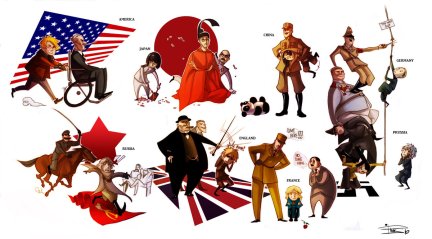Double Helix Destiny
From The Wilson Quarterly:
 What gives rich societies their mojo? Scholars who look for the roots of economic development offer an array of answers: Culture, history, or geography push a country toward prosperity, they claim.
What gives rich societies their mojo? Scholars who look for the roots of economic development offer an array of answers: Culture, history, or geography push a country toward prosperity, they claim.
Quamrul Ashraf and Oded Galor, economists at Williams College and Brown University, respectively, propose an entirely different explanation: genetic diversity. They say the range of a given population’s genes—determined 70,000 to 90,000 years ago when humans first journeyed out of East Africa—played a decisive role in determining which lands would hit the economic jackpot.
In a process known as the serial founder effect, populations closer (via land migration routes) to modern-day Ethiopia, where the earliest evidence of Homo sapiens has been found, had higher levels of genetic diversity than groups that settled farther away. The nearer societies had more “founders”—or early settlers—and therefore more genetic variation. When smaller groups peeled off and ventured into Europe and Asia, they carried a smaller gene pool with them. It shrank further when humans trekked to the Americas.
This made all the difference. Societies flourish when their populations have just enough genetic diversity, but not too much. Genetically diverse societies are more likely to cook up new technologies; people with varying traits develop different specialties and work in complementary ways. [More]
Neo-Humanism
Roland Benedikter in The European:
 Martin Heidegger wasn’t the only one who believed that we are approaching a boundary of reciprocal man-machine relationships; a boundary which will ultimately put our conceptions of man and machine into question. Some of today’s leading thinkers – Colin McGill, Adam Keiper, Nick Bostrom, Kevin Warwick, Steven Pinker, and Bill Joy – have been fascinated by it as well. So what is all the fuss about?
Martin Heidegger wasn’t the only one who believed that we are approaching a boundary of reciprocal man-machine relationships; a boundary which will ultimately put our conceptions of man and machine into question. Some of today’s leading thinkers – Colin McGill, Adam Keiper, Nick Bostrom, Kevin Warwick, Steven Pinker, and Bill Joy – have been fascinated by it as well. So what is all the fuss about?
Technological changes have turned discussions about human self-perception from a peripheral topic into a substantive one. Our conditio humana, that which we have thus far embraced as the essence of human identity, is being put into question. For example, neurotechnologies of the newest generation aim to increase human freedom by transcending established boundaries of human capability. They do so by entering into our own flesh and blood: Brain implants have made it possible to link man and machine at the neural level and have produced simple patterns of neural-technological interaction. Some advocates harbor the ultimate hope of constructing a system of interactivity on a global level: It promises universal agency without the need to even get up from our chair.
Already, some of those technologies have reached the stage of mass adoption. Sensors can be implanted under our skin to measure blood pressure and hormone levels. Military scientists experiment with technologies that can increase soldiers’ performance and stress resistance or simply replace human warriors with drones.
While we can measure the degree to which technologies transcend physical and physiological boundaries, we can merely speculate about the ethical consequences of these developments and about their effect on human self-perception. The merging of human consciousness and technology changes not only the latter, but also the former. And the question is whether technology will become more human in the long run, or whether humans will become more technical. [More]
Can Science Lead to Faith?
Gary Marcus in The New Yorker:
The relationship between science and religion has always been vexed. Most scientists I know are nonbelievers, convinced that there is no deity, or at least that there is no convincing evidence of one. Even those who are believers, like Francis Collins, director of the National Institutes of Health, see their religion and their science as largely separate. (“If God is outside of nature, then science can neither prove nor disprove his existence,” he once wrote.)
But it has been startling to see leading scientists employ science itself in arguments for believing in a kind of supernatural: Jürgen Schmidhuber, a prominent researcher in artificial intelligence, calls for what he has dubbed “computational theology,” while Baylor College of Medicine neuroscientist David Eagleman has proposed a kind of religious perspective that he calls “Possibilianism.” Neither argues for anything like a conventional Judeo-Christian deity, but both point to something beyond the natural universe. […]
In the empirical sciences, almost everything is a matter of weighing evidence; outside of geometry, it is rare for scientists to literally prove anything. Rather, the more typical trajectory is to rule out competing theories, and accumulate more and more evidence in favor of particular hypotheses. At some level, all scientists are agnostics, and not just about religion, but about virtually everything. [More]
On Choice
Professor Renata Salecl for RSA Animate:
Explores the anxiety and dissatisfaction surrounding limitless choice. Does the freedom to be the architects of our own lives actually hinder rather than help us? Does our preoccupation with choosing and consuming actually obstruct social change?
It’s Spreading: Outbreaks & Media Scares
Jill Lepore in The New Yorker:
 Epidemics follow patterns because diseases follow patterns. Viruses spread; they reproduce; they die. Epidemiologists study patterns in order to combat infection. Stories about epidemics follow patterns, too. Stories aren’t often deadly but they can be virulent: spreading fast, weakening resistance, wreaking havoc.
Epidemics follow patterns because diseases follow patterns. Viruses spread; they reproduce; they die. Epidemiologists study patterns in order to combat infection. Stories about epidemics follow patterns, too. Stories aren’t often deadly but they can be virulent: spreading fast, weakening resistance, wreaking havoc.
During the recent swine-flu panic, Joe Biden warned Americans not to ride the subway or fly on an airplane, and pharmacies ran out of surgical masks. Why was it so hard to tell, as the story was breaking, if a flu outbreak of pandemic proportions was under way? The world is a far better place for the work epidemiologists do. Maybe, though, we could do with a few more narratologists.
The stories about epidemics that are told in the American press—their plots and tropes—date to the nineteen-twenties, when modern research science, science journalism, and science fiction were born. The germ theory of disease dates to the mid-eighteen-hundreds. Pasteur developed a rabies vaccine in 1885, launching a global battle against infectious illness. By the nineteen-twenties, scientists had developed a vaccine for diphtheria; other vaccines, like the one for polio, would take decades, but hopes ran high. In “The Conquest of Disease” (1927), Thurman B. Rice, a professor of sanitary science, predicted the eradication of sickness itself.
Meanwhile, ordinary people learned to blame germs, not God, for catastrophes like the pandemic of 1918, when at least fifty million people, including nearly seven hundred thousand Americans, died of influenza. Germ theory, which secularized infectious disease, had a side effect: it sacralized epidemiology. The nineteen-twenties witnessed the inauguration of what the historian of medicine Nancy Tomes has called the “epidemic exposé,” the hair-raising account of a disease that threatens to destroy the human race. [More]
Can the Market Speak?
Mark Bergfeld in The Berlin Review of Books:
 When first reading Campbell Jones’s Can the Market speak? I simply treated it by the author’s self-imposed standards: a philosophical enquiry into the market and “the structure of the ideas and fantasies that come with the category of the market” (7). If I had finished writing this book review before Cypriot bank heist and the run on banks it would have probably remained at the level of summarizing the book, and making some snarky comments on particular points I liked or didn’t like. (…)
When first reading Campbell Jones’s Can the Market speak? I simply treated it by the author’s self-imposed standards: a philosophical enquiry into the market and “the structure of the ideas and fantasies that come with the category of the market” (7). If I had finished writing this book review before Cypriot bank heist and the run on banks it would have probably remained at the level of summarizing the book, and making some snarky comments on particular points I liked or didn’t like. (…)
Every Economics, Business and Political Science student will have been taught that the markets are ‘rational’, ‘robust’, and ‘efficient’. While the reality couldn’t be further from the truth, these tenets act as an ‘organizing principle’ of the current status quo, permeate every aspect of social life and legitimize the exploitation and destruction of humans and their environment in the name of ‘efficiency’. By solely focussing on the personification of the markets, Jones reveals a contradiction in capital’s attempt to paint the markets as behaving rationally: The supposed rational actors inside of the markets are guided by “the invisible hand of the market”. In other words, underlying the very rationality of the market one finds irrationality, superstition…
Jones’s psychoanalytic and theological critiques of the prosopopoeia of the markets disclose how hegemony manifests and legitimises itself. His psychoanalytic critique analyses power as ‘displaced’ and hidden. Rather than manifesting itself through the truncheon of a police officer, the prosopopoiea expresses individual actors’ interests i.e. capital’s interests. While psychoanalytic critique remains, or once again has become, fashionable it doesn’t assist us in understanding the real social relations that the market masks behind its veil of rationality and efficiency, nor does it help us to analyse what happens when these so-called hidden powers come out into the open when losses are socialised and profits are privatised . [More]
Towards a European spring
Ulrich Beck in openDemocracy:
The crisis of Europe has been analyzed from the perspective of political institutions, the economy, elites, governments, and the law, but not from the perspective of the individual. What does Europe mean for individuals and what principles can be developed on this basis for a social contract for a new Europe from below?
Europe is not a national society and it also cannot become a national society, because it is composed of democratically constituted national societies. And in this national sense, Europe is not a society either.
European ‘society’ must rather be conceived as a ‘cosmopolitan society of national societies’. The task is then to find a form of European union that, by virtue of its communal strength, legally protects every individual in every national society and at the same time enriches and enhances the freedom of every individual, by bringing him or her together with individuals with other languages and political cultures.
Everywhere in Europe young people are becoming aware that, although the culture of their native country is certainly important and constitutive of their identity, it is not sufficient for understanding the world. Young people want to become acquainted with other cultures because they sense that cultural, political, and economic questions are closely embroiled with globalization.
According to this analysis, young people experience European society as a “double sovereignty”, as the sum of national and European opportunities for development. Contrary to what is often expected, they do not describe their identity as an independent European identity. Nobody is only a European. Young Europeans define themselves in the first instance in terms of their nationality and then as Europeans. In this sense, young people experience a cosmopolitan Europe in which national differences and antagonisms mix and becoming blurred: more freedom through a cosmopolitan Europe.
Why is this individual experience of a lived Europe practically absent in the current controversy over the euro crisis and the European crisis? [More]
Whose Enlightenment Was It?
From The Wilson Quarterly:
 Move over, Voltaire, and make room for Yu Kilchun, Rammohan Roy, and a host of other strangers in the Enlightenment pantheon. Scholars and intellectuals have been hacking away at the Enlightenment for years, arguing that the “age of reason” was just a mirage or a cleverly veiled vehicle of oppression. Now Sebastian Conrad, a historian at Berlin’s Free University, argues that the very idea that the Enlightenment was solely a European creation is wrong.
Move over, Voltaire, and make room for Yu Kilchun, Rammohan Roy, and a host of other strangers in the Enlightenment pantheon. Scholars and intellectuals have been hacking away at the Enlightenment for years, arguing that the “age of reason” was just a mirage or a cleverly veiled vehicle of oppression. Now Sebastian Conrad, a historian at Berlin’s Free University, argues that the very idea that the Enlightenment was solely a European creation is wrong.
The great ideas of the Enlightenment—individual rights, secularism, the belief in science—were not merely invented in the West and disseminated elsewhere, Conrad contends, but continuously reinvented around the world. And the Enlightenment didn’t end in 1800, as standard accounts say, but continued into the 19th century and beyond. As if to blur the old boundaries, Conrad often speaks of Enlightenment rather than the Enlightenment.
“Much of the debate about Enlightenment in Europe can be understood as a response to the challenges of global integration” as European explorers’ contacts with the Indians of North America, China’s Mandarins, and others raised new questions about human existence. But it wasn’t a one-way street. During the French Revolution, the National Assembly “explicitly denied the extension of civil rights to slaves.” It was only after a 1791 slave revolution in their Haitian colony that the French were compelled to rethink their position. Three years later, they abolished slavery.
It’s condescending and “Eurocentric,” Conrad continues, to cling to the traditional notion that the Enlightenment ended around 1800, because doing so excludes others’ contributions. [More]
Do countries have a DNA?
George Walden in TLS:
 Almost every year for four decades Alain Minc – economist, businessman and leading public intellectual – has produced a book, or rather long essay, a lively French format at which he excels. With its Carlylean overtones last year’s title exudes a whiff of the forbidden. Nations, souls? Next thing he’ll be trying to persuade us that we have national characteristics.
Almost every year for four decades Alain Minc – economist, businessman and leading public intellectual – has produced a book, or rather long essay, a lively French format at which he excels. With its Carlylean overtones last year’s title exudes a whiff of the forbidden. Nations, souls? Next thing he’ll be trying to persuade us that we have national characteristics.
The fact that Minc is a very modern man (his first book was on cybernetics) who gives his subject scientific cover (in the book he speaks of DNA rather than souls) will do little to soothe misgivings: “The feeling has anchored itself in my thinking ever more strongly that countries, like individuals, possess a DNA, and that even if there too a division has established itself between the innate and the acquired, their behaviour on the international stage has been largely conditioned by their underlying nature [leur nature profonde]”.
Gene-speak in foreign affairs, he knows, will expose him to a “volée de bois vert” from the “academic tribe”. The caning duly came. Confining himself to 500 years of European history, with a brief chapter on America, may perhaps temper the assault, since Westerners are permitted to characterize themselves and each other more freely and more negatively than other peoples.
Britain’s DNA, in his unexceptional view, includes control of the seas in the service of empire, the power of money and business, the cult of Parliament, and the obsession with frustrating the emergence of a dominant Continental power. The transformation of piracy into patriotism in the sixteenth century, and a relative political stability, were to turn a minor, insular folk into the mistress of half the world. Echoing Niall Ferguson, he writes that Britain’s rise after 1600 depended on robbing the Spanish, copying the Dutch, beating the French and pillaging India. Positive national traits include Britain’s tax base (from which the aristocracy, unlike in France, was not excluded), an intensive debate about protectionism and free trade, and the involvement of local elites in colonial government, as distinct from France’s simple extension of the prefectoral system. [More]
Ephemeral Kingdoms, Eternal Cities
Saskia Sassen in The European Magazine:
 The great metropolises of the globe have outlived kingdoms and empires. The world’s oldest centers of political power will dominate the 22nd century. The influence of cities will eclipse the power of nation-states.
The great metropolises of the globe have outlived kingdoms and empires. The world’s oldest centers of political power will dominate the 22nd century. The influence of cities will eclipse the power of nation-states.
Our geopolitical space is getting crowded. Over the last three decades we have seen the addition and consolidation of significant new actors, such as the WTO and the International Criminal Court, and the strengthened role of older actors such as the IMF and civil society organizations. There are over a hundred other regulatory bodies that have emerged and aspire to govern our increasingly globalized economies, polities, criminalities, terrorisms, epidemics, environmental destructions.
None of these has fully replaced national governments. The latter continue to be the major actors, partly because they are far more complex in their all-encompassing functions and (at times at least) capabilities.
But now we see emerge a network of complex actors with multiple capabilities who find themselves at the forefront of many of our major challenges –from the environment to terrorism. They are cities, especially global cities. It is not that the diverse leaderships of cities want to compete with national states in our global geopolitical space. They don’t. They simply have had to address these major challenges because it is in cities where they become acute, urgent, empirical –one can act on them directly.
More and more cities are collaborating with each other, sharing experiences and discoveries of what works and what not in a rapidly growing range of global challenges. [More]

